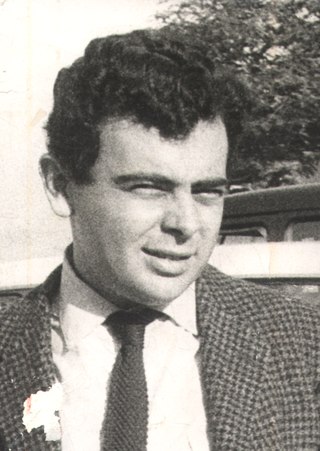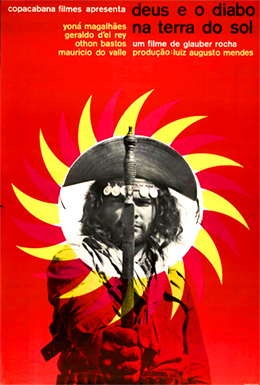This is a list of films produced in Brazil in 1964.
This is a list of films produced in Brazil in 1964.
Bossa nova is a relaxed style of samba developed in the late 1950s and early 1960s in Rio de Janeiro, Brazil. It is mainly characterized by a calm syncopated rhythm with chords and fingerstyle mimicking the beat of a samba groove, as if it was a simplification and stylization on the guitar of the rhythm produced by a samba school band. Another defining characteristic of the style is the use of unconventional chords in some cases with complex progressions and "ambiguous" harmonies. A common misconception is that these complex chords and harmonies were derived from jazz, but samba guitar players have been using similar arrangement structures since the early 1920s, indicating a case of parallel evolution of styles rather than a simple transference from jazz to bossa nova. Nevertheless bossa nova was influenced by jazz, both in the harmonies used and also by the instrumentation of songs, today many bossa nova songs are considered jazz standards. The increase in popularity of bossa nova has helped to renew samba and contributed to the modernization of Brazilian music in general.

Glauber de Andrade Rocha was a Brazilian film director, actor and screenwriter. He was one of the most influential moviemakers of Brazilian cinema and a key figure of Cinema Novo. His films Black God, White Devil and Entranced Earth are often considered to be two of the greatest achievements in Brazilian cinematic history, being selected by Abraccine as, respectively, the second and fifth best Brazilian films of all-time. Rocha also the distinction of having the most films on Abraccine's list: 5 films.

"Garota de Ipanema", "The Girl from Ipanema", is a Brazilian bossa nova and jazz song. It was a worldwide hit in the mid-1960s and won a Grammy for Record of the Year in 1965. It was written in 1962, with music by Antônio Carlos Jobim and Portuguese lyrics by Vinícius de Moraes. English lyrics were written later by Norman Gimbel.

The military dictatorship in Brazil, occasionally referred to as the Fifth Brazilian Republic, was established on 1 April 1964, after a coup d'état by the Brazilian Armed Forces, with support from the United States government, against president João Goulart. The Brazilian dictatorship lasted for 21 years, until 15 March 1985.

Héctor Eduardo Babenco was an Argentine-Brazilian film director, screenwriter, producer and actor who worked in several countries including Brazil, Argentina, and the United States. He was one of the first Brazilian filmmakers to gain international critical acclaim, through his films which often dealt with social outcasts on the fringes of society. His best-known works include Pixote (1980), Kiss of the Spider Woman (1985), Ironweed (1987), At Play in the Fields of the Lord (1990) and Carandiru (2003).
Cinema Novo, "New Cinema" in English, is a genre and movement of film noted for its emphasis on social equality and intellectualism that rose to prominence in Brazil during the 1960s and 1970s. Cinema Novo formed in response to class and racial unrest both in Brazil and the United States. Influenced by Italian neorealism and French New Wave, films produced under the ideology of Cinema Novo opposed traditional Brazilian cinema, which consisted primarily of musicals, comedies and Hollywood-style epics. Glauber Rocha is widely regarded as Cinema Novo's most influential filmmaker. Today, the movement is often divided into three sequential phases that differ in tone, style and content.
O Globo is a Brazilian newspaper based in Rio de Janeiro. O Globo is the leading daily newspaper in the country and the most prominent print publication in the Grupo Globo media conglomerate.

Ary Evangelista de Resende Barroso was a Brazilian composer, pianist, soccer commentator, and talent-show host on radio and TV. He was one of Brazil's most successful songwriters in the first half of the 20th century. Barroso also composed many songs for Carmen Miranda during her career.

Ivan Tors was a Hungarian playwright, film director, screenwriter, and film and television producer with an emphasis on non-violent but exciting science fiction, underwater sequences, and stories involving animals. He started a Miami-based film studio now known as Greenwich Studios, and later a music company.

Black God, White Devil is a 1964 Brazilian Western adventure film directed and written by Glauber Rocha, and starring Othon Bastos, Maurício do Valle, Yoná Magalhães, and Geraldo Del Rey.

José Mojica Marins was a Brazilian filmmaker, actor, composer, screenwriter, and television horror host. Marins is also known for creating and playing the character Coffin Joe in a series of horror films; the character has since gone on to become his alter ego as well as a pop culture icon, a horror icon, and a cult figure. The popularity of Coffin Joe in Brazil has led to the character being referred to as "Brazil's National Boogeyman" and "Brazil's Freddy Krueger".

Eduardo de Oliveira Coutinho was a Brazilian film director, screen writer, actor and film producer, known as one of the most important documentarists in Brazil.

Ruy Alexandre Guerra Coelho Pereira is a Portuguese-Brazilian film director and screenwriter. Guerra was born a Portuguese citizen in Lourenço Marques in Mozambique, when it was still a Portuguese colony.
Anselmo Duarte Bento was a Brazilian actor, screenwriter and film director.

Walter Hugo Khouri was a Brazilian film director, screenwriter, and producer of Lebanese and Italian descent.

Patricia Gadelha Pillar is a Brazilian actress, producer, film director, screenwriter, and television presenter.

Leonardo Villar was a Brazilian actor. He became internationally known for his performance as Zé do Burro in Anselmo Duarte's O Pagador de Promessas, the only Brazilian film so far awarded a Palme d'Or at the Cannes Film Festival.

João Lutfi, known professionally as Sérgio Ricardo, was a Brazilian film director and composer. He directed five films between 1964 and 1974.

Breno Silveira was a Brazilian filmmaker noted for having directed Two Sons of Francisco, the highest-grossing film of 2005.